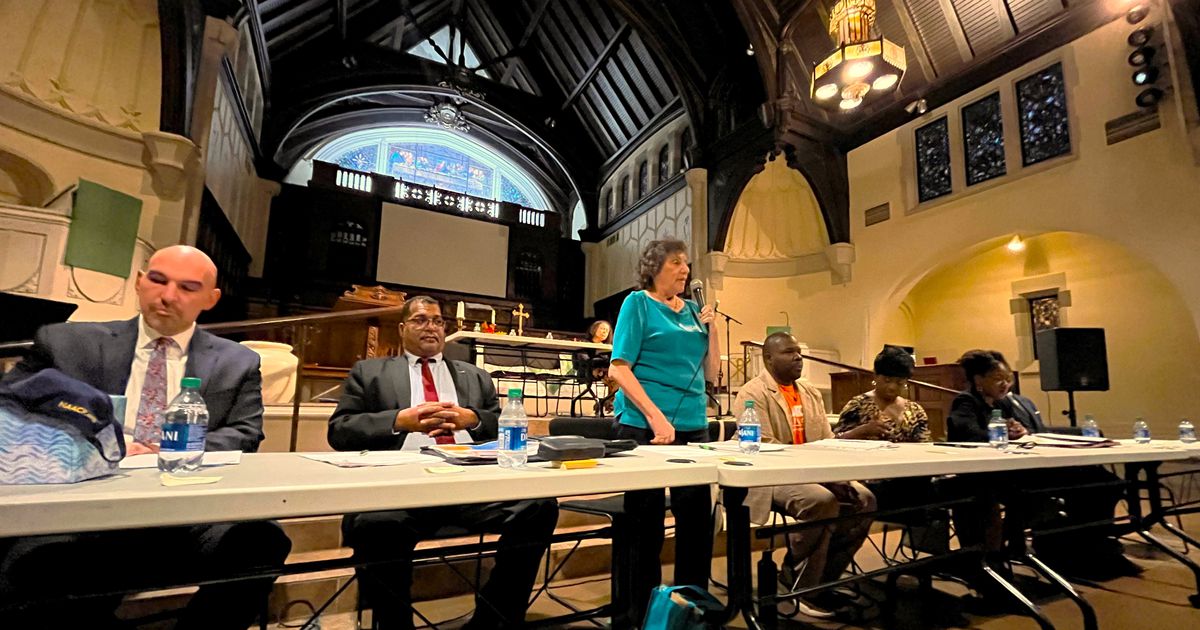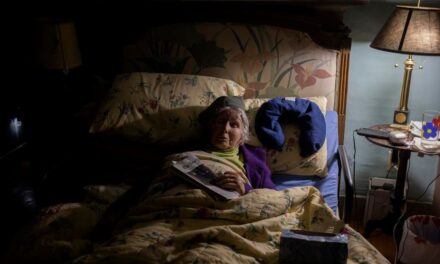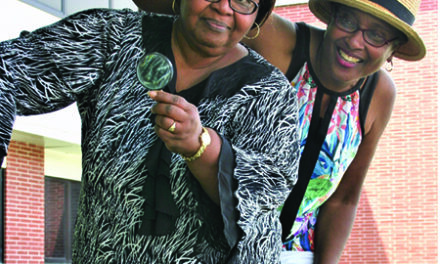
Two incumbents face two challengers in a Dayton City Commission race next month that could change the power structure at City Hall and features candidates with very different views on the condition and health of the city.
Incumbent City Commissioners Matt Joseph and Chris Shaw say things have gotten a lot better in Dayton on their watch and that they offer experienced and mature leadership to keep the city moving in the right direction.
Opponents Marcus Bedinger and Valerie Duncan say many neighborhoods are in bad shape, and they claim the incumbents often ignore the concerns and wishes of the community. Bedinger and Duncan say they have new ideas and fresh perspectives and would be independent voices on the commission who would help dismantle a current three-person majority that makes many important decisions.
Background
The Dayton City Commission has five members, and Joseph’s and Shaw’s seats are up for grabs on Nov. 7. The top two vote-getters in the four-way race will win office.
This is a closely watched contest that has implications about who controls power on the dais.
Joseph, Shaw and Mayor Jeffrey Mims Jr. sometimes butt heads with the other two members of the current commission, Shenise Turner-Sloss and Darryl Fairchild.
The two groups occasionally have clashed over budget priorities, spending, proposed police tools and programs, staffing levels for certain departments and other issues. This has led to some 3-to-2 votes, with Joseph, Shaw and Mims in the majority. All three were endorsed by the Montgomery County Democratic Party, while Turner-Sloss and Fairchild were not and had to defeat party-endorsed candidates to win their seats.
Matt Joseph
Joseph, 51, who lives in the Belmont neighborhood of southeast Dayton, is vying for a sixth term on the city commission.
Joseph, a principal logistics engineer with Sierra Nevada Corp., said running for office this year feels a little different than previous election cycles because there are so many good things going on in the city.
“It’s harder to run when you’re just running on, ‘I’m doing my best to keep the city afloat,’ ” he said, noting that Dayton faced some daunting challenges earlier in his political career. “Now there’s interesting things going on and I talk as much as I can about sustainability and about new jobs and all kinds of good stuff.”
Joseph has been a vocal advocate for pursuing green initiatives and investments. The city is working to install solar arrays and switch the city fleet over to electric vehicles, and it recently approved a deal to sell a gas byproduct from city’s the wastewater treatment facility to an energy company.
Joseph also highlighted that Dayton has created many new jobs in recent years, with many more on the way, especially around the Dayton International Airport.
Still, he said many residents are having a tough time, and he said he will keep trying to find ways to connect these individuals to new and future job opportunities and resources that might be able to help.
Joseph said he is really proud of the ongoing police reform work that he helped lead. He said Dayton’s made more meaningful changes to police practices and policies than any other community in the nation.
Joseph said his experience also will be valuable in the next couple of years when the city’s $138 million in federal COVID relief funds run out. That funding is helping plug revenue holes in the general fund.
Joseph said it’s important for city leadership to make smart financial decisions that set the city up for long-term success.
The city has faced a lot of hardship ranging from the tragedies of the Memorial Day tornadoes and the Oregon District mass shooting to the economic fallout caused by the COVID pandemic, Joseph said.
The city’s margin for error has been pretty thin and yet the city commission has weathered the crises that have arisen and the city is getting cleaner and safer and continues to welcome new residents, jobs and investment, he said.
“It would be a bad idea to have new people come in and potentially change the balance that’s gotten us this far,” he said. “You need folks who have good common sense, folks with experience in getting us through bad times and tough financial times, to continue the growth that we’ve seen and the good things that have been happening.”
Marcus Bedinger
Bedinger, 35, who lives in the Roosevelt neighborhood of west Dayton, said Dayton voters are ready for a change at City Hall.
Bedinger, the retail manager of a downtown CVS store, said he is more in tune with what the community wants and cares about than his political opponents because of his diverse life experiences and the challenges he’s faced and overcome.
Bedinger said he knows what it’s like to be unemployed and how hard it can be to go without health care or stable housing. He said he connects with voters on a personal level.
“I think people are excited about who I am as a person,” he said. “I’m a younger guy, I’m Black, I am openly gay, I have biological children, and people are excited about what representation can really mean.”
While parts of Dayton have seen improvements, many residents are struggling and they feel left out and overlooked, said Bedinger, who once worked as a constituent liaison for U.S. Rep. Alexandria Ocasio-Cortez (AOC).
Huge sums have been invested downtown, but many city residents never go downtown, he said, adding that he would push hard for the city to invest more heavily in its neighborhoods instead of in the urban core.
“They (voters) do want something different — they understand we’ve been doing the same thing for a long time,” he said. “Even where we see changes, it’s not in their neighborhoods — it’s not changing their material conditions.”
Bedinger said voting Shaw or Joseph out of office, or both, would result in a major power shift that would change the direction of the city and the city organization.
“If we change just one seat, we get back to old-fashioned deliberation and collaboration, and that is so critical for our democracy,” he said.
Bedinger claims that Joseph, Shaw and Mims have ignored legitimate concerns raised by community members.
For example, he said the trio voted to approve new police surveillance tools and remove the Minority Business Assistance Center from city control even though many community members opposed these moves.
Bedinger said if elected he might reevaluate the city’s use of controversial technology or programs like automated speed detection trailers, which he says issue citations carrying fines that poor community members probably cannot afford.
City leaders also need to do a lot more to increase the local supply of affordable housing, Bedinger said.
He supports inclusionary zoning policies, which generally tie the construction of new market-rate housing or commercial development to the creation of new housing that is affordable to lower-income community members.
Chris Shaw
Shaw, 57, the owner of Shaw Cleaners in West Dayton, is seeking a third term on the commission.
Shaw, who lives in the Wynwood estates area of northeast Dayton, said his business background and knowledge makes him an asset on the elected body, and that he has good relationships with many important stakeholders through his work serving on multiple community boards.
Shaw said voters are sharp and they know what’s going on in the city. He said they see the changes in their neighborhoods and they take notice when dilapidated properties are torn down, roads are repaved and new amenities open up.
“Is (everything) perfect? No, it is not,” he said. “We have a lot more work to do, and I want to be there to see that work take place and we’re well on our way, and things are really moving in the right direction.”
Shaw said he’s proud of an apprenticeship program called Building Futures that he helped stand up that connects urban youth and young women and people of color to the skilled trades. Most participants get jobs right after finishing the program, and they can earn as much as six figures, he said.
“It is life changing, family changing and neighborhood changing,” he said.
Although many new businesses are coming to the Dayton region, the community has workforce issues, and the city must do everything it can to link residents with job-training programs to ensure they have the right skills for new high-paying employment opportunities, Shaw said.
Shaw said he believes one of his roles on the commission is to help expose young people to potential career opportunities.
He said he’s been heavily involved in the promotion of Air Camp, which gives kids a chance to learn about careers in aviation and aeronautics.
Shaw said he thinks it’s a mistake and unhelpful to trash the city, as he claims his political opponents often do. He said he questions whether Duncan and Bedinger fully understand how economic development works.
“Positivity attracts development, and negativity does just the opposite, and makes folks not want to invest, move to and be a part of Dayton,” he said. “It’s critical we tell our story and tell it in an effective way.”
Despite criticism to the contrary, Shaw said focusing investment in downtown early on was a best practice that has really paid off. He said redevelopment activities and investment grow out from the urban core.
Shaw pointed to a recent development update provided by city staff that suggested that more than $1.3 billion is being invested in neighborhoods across Dayton between 2023 and 2025.
“We’ve been making some remarkable strides, and I just want to keep it going,” he said. “Leadership matters.”
Valerie Duncan
Duncan, 65, who lives in Eastern Hills in east Dayton, worked in zoning administration for the city’s building department before retiring after 31 years.
Duncan said she constantly interacted with community members and that she has a special talent for helping people solve complicated issues.
Duncan said she would use her expertise in government operations and the budget process to reduce red tape at City Hall.
Many residents are unhappy with the level and quality of service they are receiving in the city, Duncan said, adding that she’s heard from many people who are upset about bumpy roads, illegal dumping, trash in the streets and alleyways and nuisance properties in their neighborhoods.
She said the city must do a better job at customer service. She said citizens are frustrated because they take their concerns to city leaders hoping to get help but too often they leave empty-handed.
Duncan said if elected she would ensure the city is more responsive to citizens and more transparent about what it has done and will do to address their issues.
“I am … a person who wants to hear about (voters’) concerns, cares about their concerns, cares about their neighborhoods, cares about the individuals and how they are doing and how their neighborhoods are doing,” Duncan said.
Downtown Dayton has seen a lot of new investment, but Duncan claims the city has not deployed the same kinds of incentives and economic redevelopment tools in the neighborhoods.
Duncan also said Dayton is not putting enough money toward eliminating blight, especially when it comes to the city’s $138 million in federal COVID relief funds. Dayton plans to use about $12.4 million of its COVID relief aid to knock down deteriorating eyesores, and the city also plans to put money from other funding sources toward demolition work.
But Duncan said the city can and should do more about blight and housing issues because they are among the most urgent problems facing the community.
Duncan said the city needs new and better programs to provide more residents with assistance to fix up and remain in their homes, and she wants to see new help for first-time homebuyers.
The city, Duncan said, also needs to step up enforcement of its housing and zoning code because poor housing conditions are not being properly addressed.
Duncan said her other priorities include expanding activities and programming for young people and improving the system that protects the local water supply.
Duncan said if she is elected, that would put an end to the “monopoly of power” at City Hall.
However, she said she would not “pick sides” and she would work with everyone on the commission.
“What (residents) tell me is they want someone new, somebody with new ideas on the city commission,” she said.




